英汉翻译实用技巧(2)
英文翻中文的八大翻译技巧

英文翻中文的八大翻译技巧英文翻中文的八大翻译技巧推荐首先是英文理解难,这是学习、使用英文的人的共同感觉,由于两国历史、文化、风俗习惯的不同,所以一句英文在英美人看来顺理成章,而在中国人看来却是颠颠倒倒、断断续续,极为别扭。
二是中文表达难,英译汉有时为了要找到一个合适的对等词汇,往往被弄得头昏眼花,好像在脑子里摸一个急于要开箱子的钥匙,却没有。
另外,英译汉时对掌握各种文化知识的要求很高,因为我们所翻译的文章,其内容可能涉及到极为广博的知识领域,而这些知识领域多半是我们不大熟悉的外国的事情,如果不具备相应的文化知识难免不出现一些翻译中的差错或笑话。
正是因为英译汉时会遇到这么多的困难,所以,我们必须通过翻译实践,对英汉两种不同语言的特点加以对比、概况和总结,以找出一般的表达规律来,避免出现一些不该出现的翻译错误,而这些表达的规律就是我们所说的翻译技巧。
一、词义的选择和引伸技巧英汉两种语言都有一词多类和一词多义的现象。
一词多类就是指一个词往往属于几个词类,具有几个不同的意义;一词多义就是同一个词在同一词类中又往往有几个不同的词义。
在英译汉的过程中,我们在弄清原句结构后,就要善于运用选择和确定原句中关键词词义的技巧,以使所译语句自然流畅,完全符合汉语习惯的说法;选择确定词义通常可以从两方面着手:1、根据词在句中的词类来选择和确定词义They are as like as two peas .他们相似极了。
(形容词)He likes mathematics more than physics .他喜欢数学甚于喜欢物理。
(动词)Wheat, oat, and the like are cereals .小麦、燕麦等等皆系谷类。
(名词)2、根据上下文联系以及词在句中的搭配关系来选择和确定词义。
He is the last man to come .他是最后来的。
He is the last person for such a job .他最不配干这个工作。
翻译技巧-2
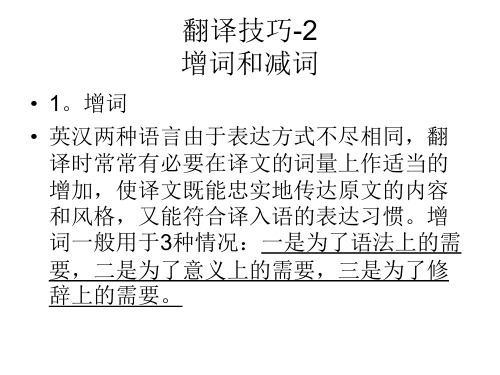
• 2。从修饰的角度进行省略 • The hardest part of any big project is to begin. 任 何一个大的项目最艰难的是起步。 • The problem of alternative fuels of vehicle is one problem we shall approach. • 车辆的代用燃料是我们将要着手处理的一个问题。 • Walking for walking’s sake may be as highly laudable and exemplary a thing as is held by those who practice it. 经常散步的人认为,为散 步而散步是值得高度赞扬和仿效的。
• 总结,要克服翻译症,必须解决好以下几个环节 的问题: • 首先要克服认识的片面性,一般来说,有翻译症 倾向的译者,在翻译标准的把握上,比较重视忠 实,忽视通顺,而在处理内容和形式这对矛盾中, 又过于强调形式上的对应,忽略了对原文精神的 准确把握。 • 第二,在语汇问题上,切不可望文生义,也不可 盲目照搬辞典里的释义。 • 第三,在句法上不要全盘欧化,即异化。而要适 度考虑归化法。也即是向汉语行文文法靠拢。
• 英语中常用省略句,翻译时要根据汉语的表达习 惯,作些适当的增补。例如: • Histories make men wise; poems witty; the mathematics subtle; natural philosophy deep. 饱 读史书使人明智,吟诵诗篇让人诙谐,研究数学 使人严谨,精通哲学让人深邃。 • Staycations became popular during the financial crisis of 2007-2009, amid growing unemployment and rising gas prices. • 居家度假的形式在2007至2009年金融危机期间失 业率和油价不断攀升的情况下大受欢迎。
英译汉翻译技巧最新例句

• 他给我讲述了他旳经历,那些经历是我此 前从未据说过旳。
• He did not remember his father who died when he was three years old.
• As an obedient son, I had to accept my parents’ decision that I was to be a doctor ,though the prospect interested in me not at all.
• 作为一种孝顺旳儿子,我不得不接受父母 旳决定,去当大夫,虽然我对这么旳前途 毫无爱好。
• Judgment should be based on facts, not on hearsay.
• 判断应该以事实为根据, 而不应该依道听 途说。
• The man I saw at the party looked and talked like an American.
• 我在晚会上看到旳那个人,外表和谈吐像 美国人。
1.英语名词→汉语动词
• 英语中具有动作意义或由动词转化过来旳 名词,汉译时往往转化为动词。如:
• His arrival at this conclusion was the result of much thought.
• 他得出这结论是深思熟虑旳成果。
2.英语动词→汉语名词
• 有些动词在汉语里虽有相相应旳动词词义, 但在某种特定旳语言场合下不能使用该动 词词义,或因为需要选择另一种更加好旳 译文,因而将其转化为汉语旳名词。如:
• 单词旳分译即拆词,将难译旳词从句子主 干中拆离出来,另作处理,这种措施经常 引起句式上旳调整,英译汉中要拆译旳词 经常是形容词和副词。如:
翻译常用技巧2
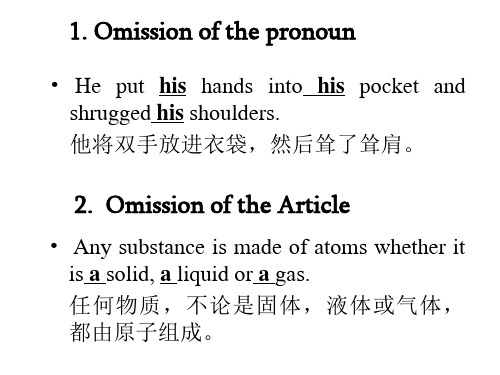
back
句子成分、语态转换
• 1. Brussels fell to him on September 3 and Antwerp the next. • 他于9月3日攻克了布鲁塞尔,次日又拿下 安特卫普。 • 2. They were attended from morning to night by female helpers, wives and nurses and secretaries. • 从早到晚,都有妻子、护士、秘书这样的 女帮手服侍他们。
Conversion转换法
• 定义 • 词性转换 • 句法成分、语态转换 • 叙述角度、表达方式转换
• Exercises
• This watch never varies more than a second in a month.
这块表一个月的误差从不超过一秒钟。
• Rockets have found application for the exploration
II. Omission in C –E Translation
Omission in C-E translation is employed in three circumstances: generally
• redundant words in original Chinese, such as unnecessary repetition and wordy expressions; • the original meaning that has already been implied in the context of English version;
of the universe.
火箭已经用来探索宇宙。 • Careful comparison of them will show you the difference. 只要仔细把它们比较一下,你就会发现不同之处。
句子翻译技巧(二)英译汉
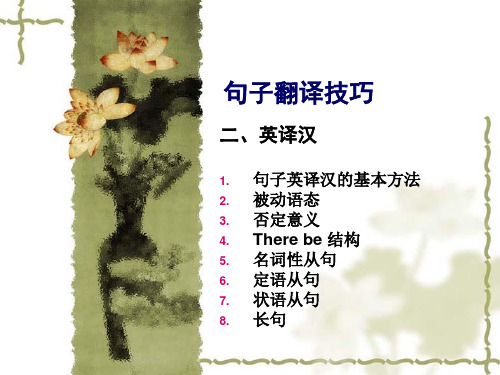
名词性从句
❖ 主语从句 1、由关系代词引导的主语从句,一般可按原文语序 翻译 2、由it作形式主语的主语从句,翻译时位置可前可 后
❖ 宾语从句 翻译时一般不需要改变其位置。(it作形式宾语或 介词宾语时,适当调整语序)
9. Every moment of every day, energy is being transformed from one form into another . 每时每刻,能量都在由一种形式变为另一种形式。
10. The pyramids stand huge and silent. 金字塔巍然耸立,庄严肃穆。
6. There is another problem in referring to the USA, since some Latin American countries are also “United States.”. USA这个称呼还有另外一个问题,因为某些拉丁美洲国 家也是United States(“合众国”) 。
❖ 简单句:只有一个主语和一个谓语的句子称为简单句。 ❖ 复合句:复合句由一个主句和一个或一个以上的从句
构成。
句子英译汉的基本方法
2. 句式变化
① 时间顺序 ② 逻辑顺序
句子英译汉的基本方法
其他情况(描述与评论的顺序):
❖ It is important that everyone does his duty. ❖ 每个人各司其责,这一点是很重要的。
3. The time was when we were happy and gay. 那时候我们无忧无虑。
实用翻译教程(2)
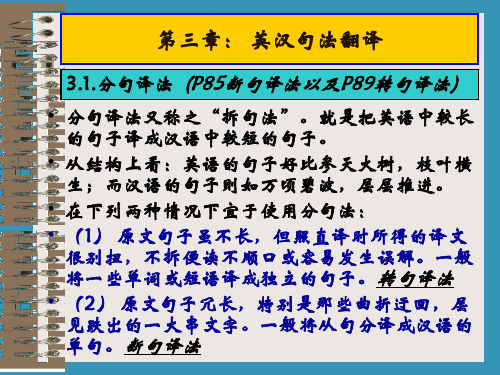
• • • •
• • • •
Their power increased with their number. 他们人数增加了,力量也随之增强。 (并列分句) I found the house suddenly, and stood there with my heart beating fast and tears coming to my eyes. (并列分句) 我突然找到那所房子。 我站在那里,心剧 烈地跳着,泪水也涌上眼睛。 We cannot see it clearly for the fog. 由于有雾,我们看不清它。 (译成原因分句)
• 男人们很聪明,他们不会上时装设计师的当。
• 4 . Energy can neither be created nor destroyed, a universally accepted law. • 能量既不能被创造也不能被消灭,这是一 条公认的规律。 (名词短语) • 5 . The night was chilly—it was early November. A light drizzle added to my discomfort . • 夜里冷风飕飕,那是 十一月初,天下起 了毛毛细雨,令我倍加难受。
• 她可以谅解地为自己高超的烹调技艺感到自豪。 • 她自夸她高超的烹调技艺,这是情有可原的。
• 2. The ancients tried unsuccessfully to explain how a rainbow is formed.
• 古人曾试图说明彩虹是怎样产生的,但没 有成功。
• 3. Chairman Mao might have spoken with understandable pride of his policy of “selfreliance.”
汉译英翻译常用技巧2

3. 我们学院受教委和市政府的双重领导。 Our institute is co-administrated by the States Education Commission and the municipal government. (名词转动词)
4. 由于我们实行了改革开放政策,我国的综合国 力有了明显的增强。 Thanks to the introduction of our reform and opening policy, our comprehensive national strength has greatly improved. (动词转名词)
5. 林则徐认为, 要成功地禁止鸦片买卖, 就得 首先把鸦片焚毁。 Lin Zexu believed that a successful ban of the trade in opium must be preceded by the destruction of the drug itself.
2. 这种人闹什么东西呢?闹名誉,闹地位,闹出风头。 What are they after? They are after name, after position, and they want to cut smart figure将具有动作 性的名词转换为汉语的动词,或者将可表示概念 的动词转换为汉语名词。
汉译英时则反其道而行之。
•
For students of composition, an awareness that rhetorical patterns differ from one culture to another can help them become more quickly proficient in a writing pattern that is not native to them.
英汉翻译实用技巧

英汉翻译实用技巧语言的互相翻译不但有利于各国文化的交流,更有利于语言的发展。
在搞翻译工作时最怕碰上习语多的文章。
因为为了忠于原者,译文必须既坚持它的外国味,但也要符合本国文字的要求,而翻译习语却是最难把这两个标准一同达到的。
为了要适汉地把外国语言中的习语忠实地翻译出来,有经验的翻译工作者一般采取下列几种方法:一、正确理解理解主要通过原文的上下文来进行,译者必须从上下文的关系中来探求正确译法。
上下文可以是一个句子、一个段落,也可以是整节、整章,以至全文、全书。
为透彻理解原文,须理解语言现象,逻辑关系等。
下面从语义分析,语境分析和语用分析三个方面阐述如何正确理解原文。
(一) 语义分析(Semantic analysis)语义分析是指一定的语境之中,按照一定次序排列的词与词之间的语义关系及其含义。
在理解原文中某一个词的含义时,译者首先要区分清楚其概念意义(conceptual meaning)和关联意义(associative meaning),即某一个词的本意及其引申意义。
例如chair一词在下面4个句子中的意义:•seat oneself in a chair坐在椅子上(概念意义)•accept a university chair接受大学教授之职位(关联意义)•chair a meeting主持会议(关联意义)•committed to the chair处以电刑(关联意义)换言之,要正确理解原文,就要力图透过表层进入深层及透过表面意义,抓住其内在意义,暗含意义乃至其弦外之意。
比如wet一词在以下例子中的意义:•wet paint!油漆未干(勿触油漆)!•wet suit潜水服•wet nurse奶妈•wet blanket扫兴的人或事•be wet to the skin全身湿透这种一词多义的现象,在英语中是非常普遍的。
读者应对此高度重视,要勤查字典,尤其要避免离开上下文,仅仅用已知的含义生搬硬套,贻笑大方。
英汉翻译技巧(二)增词
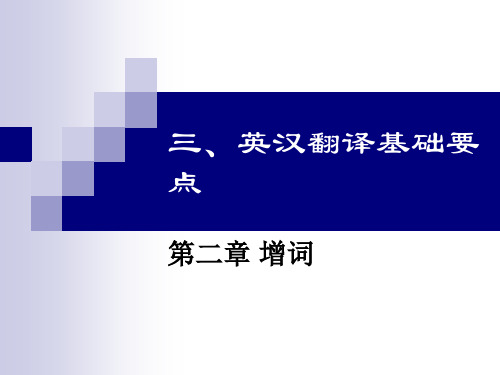
译文:然而,当她来到大海边,发
现四下决无一人时,她脱去了那件 扎人的、穿着难受的泳衣,平生第 一次赤裸裸地站在光天化日之下, 任凭阳光戏弄,任凭海风拍击,任 凭呼唤她的海浪波溅。
这种增词,既符合原意,又较
为生动地传达出埃德纳摈弃旧 的传统观念的决心及在自由中 获得新生后酣畅淋漓的心情。
试译下列句子:
这里女主人公(埃德纳)脱去扎人的、令 她难受的泳衣,赤身裸体地投入大海的怀 抱。这一艺术形象具有强烈的象征意义— —埃德纳决心挣脱与其格格不入的世俗传 统的束缚,投入大海,在死亡中寻求新生, 寻求她梦寐以求的自由。为了充分表现埃 德纳以死抗争的决心,译者重复使用了三 个“任凭”,构成排比句,以加强语气。
例1.Foreigners
get degrees from Chinese colleges.
一批外国人获得一些中国大学的学
位。 例2.They include silks and colored thread. 他们包括各种丝绸和彩线。
例3.In spite of difficulties, they succeeded in finishing their task.
有些英文句子貌似省略句,实际上什么句子成分也 没有省,但若直译成汉语,译文就不清楚,必须按 照汉语的习惯表达方式增词。如:
例1.Which
do you like better: grammar or translation exercises? 你喜欢语法练习,还是翻译练习? 例2.He has written several articles and books on high-energy physics. 他写了几篇文章何几本书,都是关于高 能物理的。
英汉翻译常用的方法和技巧练习(二)
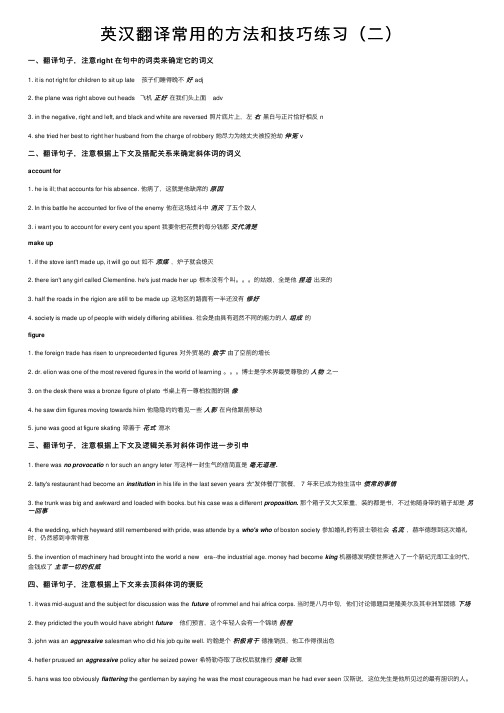
英汉翻译常⽤的⽅法和技巧练习(⼆)⼀、翻译句⼦,注意right 在句中的词类来确定它的词义1. it is not right for children to sit up late 孩⼦们睡得晚不好adj2. the plane was right above out heads 飞机正好在我们头上⾯ adv3. in the negative, right and left, and black and white are reversed照⽚底⽚上,左右⿊⽩与正⽚恰好相反n4. she tried her best to right her husband from the charge of robbery她尽⼒为她丈夫被控抢劫伸冤v⼆、翻译句⼦,注意根据上下⽂及搭配关系来确定斜体词的词义account for1. he is ill; that accounts for his absence.他病了,这就是他缺席的原因2. In this battle he accounted for five of the enemy他在这场战⽃中消灭了五个敌⼈3. i want you to account for every cent you spent我要你把花费的每分钱都交代清楚make up1. if the stove isnt't made up, it will go out如不添煤,炉⼦就会熄灭2. there isn't any girl called Clementine. he's just made her up根本没有个叫。
的姑娘,全是他捏造出来的3. half the roads in the rigion are still to be made up这地区的路⾯有⼀半还没有修好4. society is made up of people with widely differing abilities.社会是由具有迥然不同的能⼒的⼈组成的figure1. the foreign trade has risen to unprecedented figures对外贸易的数字由了空前的增长2. dr. elion was one of the most revered figures in the world of learning。
英汉翻译技巧(二)增词

例1.Foreigners
get degrees from Chinese colleges.
一批外国人获得一些中国大学的学
位。 例2.They include silks and colored thread. 他们包括各种丝绸和彩线。
例3.In spite of difficulties, they succeeded in finishing their task.
2.6 为了沟通不同的文化而加词
有时英文中的词语的理性意义在汉语
中出现词汇空缺,其联想意义也接近 空白,为了保留英语中的词语的形象, 可将其深层意义以补充的形式进行解 释行地翻译,即增加词语解释原文的 比喻含义、文化特征或文化背景以及 原文的省略部分。如:
例1.People
considered that what he had played on that occasion was no more than a Juda’s Kiss. 人们认为他在那种场合所表演的不 过是犹大之吻,居心险恶。
1.
In their first year of study they had a lot of dictation and spelling mistakes. 2. With what enthusiasm the Chinese people are building socialism. 3. The report summed up the new achievements made in culture, education and hygiene.
一个词用于特定的上下文中,除了
基本意义和派生意义外,往往还含 有一定程度的含蓄意义,若直译会 使意义晦涩或文理不通,就需根据 上下文的内在联系,增添适当的词 语,以使译文流畅,含义明确。如:
常用翻译技巧(二)

• 4)He supplied his works not only with
biographies, but with portraits of their supposed authors. • 他不仅在他的作品上提供作者传记,而且 还提供假想作者的画像。 • 5)But his wife kept dinning in his ears about his idleness, his carelessness, and the ruin he was bringing on his family. • 可是他老婆不断地在他耳朵旁边唠叨个没 完,说他懒惰,说他粗心,并且说他的一 家人都要毁在他的身上。
大王。 2)This has been our position---but not theirs. 这一直是我们的立场――而不是他们的立场。
• 3)John is your friend as much as he is
mine. • 约翰既是你的朋友,又是我的朋友。
3、重复英语前置词短语前所省略的 名词
• 2.英语中用物主代词its, his , their 等等以代替
句中作主语的名词(有时附有修饰语)时,翻 译时往往可以不用代词而重复其作主语的名词, 以达到明确具体的目的。 1)Happy families also had their own troubles. 幸福的家庭也有幸福家庭的苦恼。 2)Big powers have their strategies while small countries also their own lines. 强国有强国的策略,小国也有小国的路线。 3)Each country has its own customs. 各国有各国的风俗。
英汉翻译实用教程第3讲 英译汉 (2)
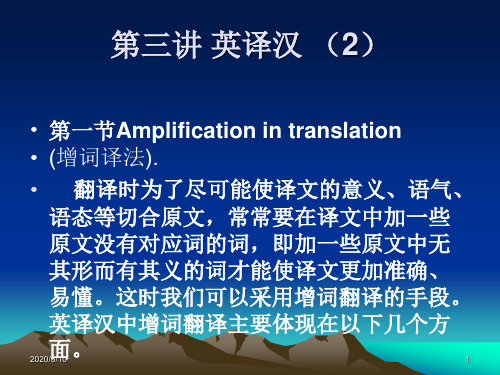
• 3) The letter “I” represents I, “O” owe, and “U” you. • 字母I代表“我”,O代表“欠”,U代表“你”。 • (将省略的动词译出来) • 4)All bodies consists of molecules and these of atoms. • 所有物体都由分了组成,而分子则由原子组成。 (原文中第二个of前省略了 ,并用these代替, 汉译时补上了动词,还原了代词。)
2013-8-7 10
• 2) Not all mergers, however, are the result of global economic trends,political change or technological innovation. BMW’s takeover of the Rover Group injected much needed investment into the struggling UK car manufacturer whilst extending BMW’s product range • 然而.并非所有的合并 都是经济全球化趋势、政治变化或者技 术革新所带来的 结果。德国宝马汽车公司接管了罗福汽车集团 (the Rover Group),给这个在挣扎中求生存的英国汽车制造公 司注入了急需的资金,同时又拓展了宝马汽车公司本身的产品 范围。 • [析:] 很多人都知道“宝马”汽车豪华、气派。但并不一定知 道它产自何地。在翻译过程中增加某种产品的产地是增加文化 知识、介绍背景知识的表现。译者在翻译过程中应该多为他人 着想,只要认为读者有可能对某个方面产生疑问就应该在翻译 的过程中首先帮助读者消除掉这些疑虑,这也是翻译者的职责所在。
汉译英翻译技巧(2)主语的选择
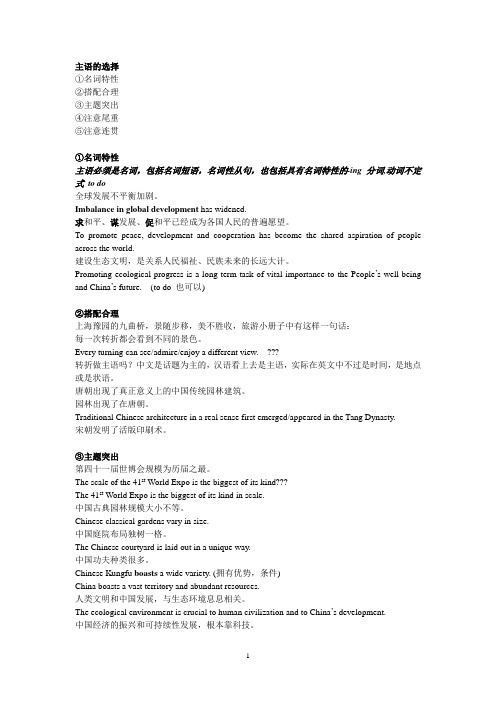
主语的选择①名词特性②搭配合理③主题突出④注意尾重⑤注意连贯①名词特性主语必须是名词,包括名词短语,名词性从句,也包括具有名词特性的-ing分词,动词不定式to do全球发展不平衡加剧。
Imbalance in global development has widened.求和平、谋发展、促和平已经成为各国人民的普遍愿望。
To promote peace, development and cooperation has become the shared aspiration of people across the world.建设生态文明,是关系人民福祉、民族未来的长远大计。
Promoting ecological progress is a long-term task of vital importance to the People’s well-being and China’s future. (to do 也可以)②搭配合理上海豫园的九曲桥,景随步移,美不胜收,旅游小册子中有这样一句话:每一次转折都会看到不同的景色。
Every turning can see/admire/enjoy a different view. ???转折做主语吗?中文是话题为主的,汉语看上去是主语,实际在英文中不过是时间,是地点或是状语。
唐朝出现了真正意义上的中国传统园林建筑。
园林出现了在唐朝。
Traditional Chinese architecture in a real sense first emerged/appeared in the Tang Dynasty.宋朝发明了活版印刷术。
③主题突出第四十一届世博会规模为历届之最。
The scale of the 41st World Expo is the biggest of its kind???The 41st World Expo is the biggest of its kind in scale.中国古典园林规模大小不等。
英译汉常用的方法和技巧2
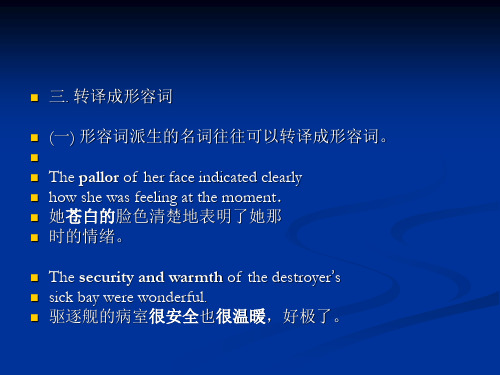
Exercise:试用所学技巧翻译下列句子,注意 斜体字的处理 1. I recognized the absurdity of dealing with them through intermediaries.
我认识到, 通过中间人跟他们打交道是愚蠢 的.
2. He was still more surprised at the singularity of the stranger’s appearance.
3.在抽象名词后增加名词
persuasion preparation backwardness tension arrogance madness antagonism 说服工作 准备工作 落后状态 紧张局势 自满情绪 疯狂行为 敌对态度
(十)增加概括词 You and I 你我两人
militarily,politically and economically 军事、政治、经济等各方面
1) The Americans and the Japanese conducted a completely secret exchange of messages. 美日双方在完全保密的情况下互相交换 了信件。 2) The thesis summed up the new achievements made in electronic computers,artificial satellites and rockets. 论文总结了电子计算机、人造卫星和火箭 三方面的新成就。
(二)增加形容词
英译汉翻译技巧及方法2

他对这个城市完全陌生,所以我希望你能给他必要的 帮助。
The blockade was a success. 封锁很成功。
between them. 他们之间一直有着传统的友好关系。
九、 Nouns—Adverbs
1. The man nodded with satisfaction. 那人满意地点了点头。 2. He had the honor to attend the congress. 他荣幸地出席了代表大会。
1). His pride must be pinched. 他这股傲气应该打下去。 2).The result of the invention of the stream engine was that
human power was replaced by mechanical power. 蒸汽机发明的结果是,机械力代替了人力。
他的讲话很不如人意。
3. Appearances are deceptive.
外貌是靠不住的。
13. Repetition
1. We have to analyze and solve problems. 我们要分析问题,解决问题。 2. I have fulfilled my assigned work ahead of schedule, so has he. 我已经提前完成了交给我的工作,他也提前完成了交给他的工作。 3. Ignorance is the mother of fear as well as of admiration. 无知是恐惧的根源,也是敬佩的根源。 4. He no longer dreamed of storms, nor of great occurrences, nor of grea
十大实用的英语翻译技巧
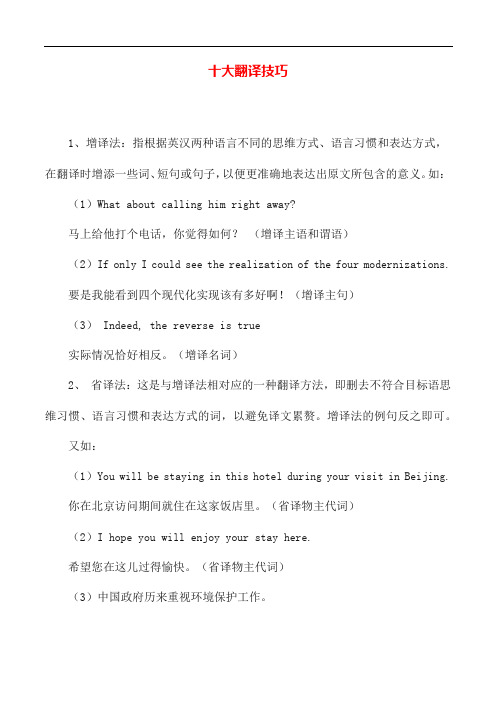
十大翻译技巧1、增译法:指根据英汉两种语言不同的思维方式、语言习惯和表达方式,在翻译时增添一些词、短句或句子,以便更准确地表达出原文所包含的意义。
如:(1)What about calling him right away?马上给他打个电话,你觉得如何?(增译主语和谓语)(2)If only I could see the realization of the four modernizations.要是我能看到四个现代化实现该有多好啊!(增译主句)(3) Indeed, the reverse is true实际情况恰好相反。
(增译名词)2、省译法:这是与增译法相对应的一种翻译方法,即删去不符合目标语思维习惯、语言习惯和表达方式的词,以避免译文累赘。
增译法的例句反之即可。
又如:(1)You will be staying in this hotel during your visit in Beijing.你在北京访问期间就住在这家饭店里。
(省译物主代词)(2)I hope you will enjoy your stay here.希望您在这儿过得愉快。
(省译物主代词)(3)中国政府历来重视环境保护工作。
The Chinese government has always attached great importance to environmental protection. (省译名词)3、转换法:指翻译过程中为了使译文符合目标语的表述方式、方法和习惯而对原句中的词类、句型和语态等进行转换。
具体的说,就是在词性方面,把名词转换为代词、形容词、动词;把动词转换成名词、形容词、副词、介词;把形容词转换成副词和短语。
在句子成分方面,把主语变成状语、定语、宾语、表语;把谓语变成主语、定语、表语;把定语变成状语、主语;把宾语变成主语。
在句型方面,把并列句变成复合句,把复合句变成并列句,把状语从句变成定语从句。
英译汉常用的方法和技巧

英译汉常用的方法和技巧英译汉常用的方法和技巧引导语:英译汉常用的方法和技巧,由应届毕业生培训网整理而成,谢谢您的阅读,祝您阅读愉快。
一、词义的选择、引申和褒贬1.一词多义(Polysemy)regularregular reading / regular job / regular flight / regular visitor / regular speed / regular army / gasolinedelicatedelicate skin / porcelain / upbringing / living / health / stomach / vase / diplomatic question / difference / surgical operation / ear for music / sense of smell / touch / food2.注意有线词的词义He once again imparted to us his great knowledge, experience and wisdom.He now saw plainly the meaning of all. In the beginning, he had got a job the first day; but now he was second-hand, a damaged article, and they did not want him. They had got the best out of him, and now they had thrown him away. The situation had now become desperate. Then came another incident.3.词义的引申(Extension or Generalization)1) Extend the word meaning to cover an abstraction conceptHis novel is a mirror of the times.The OED is the final court of appeal in all matters concerning English words.Sam knows he can depend on his family, rain or shine.2) Extend the word meaning to cover a specific conceptIn two years, he was a national phenomenon.Public opinion is demanding more and more that something be done about noise.Mary’s father, by his first marriage, had a daughter, Jane, Mary’s half-sister.4.词义的褒贬(Commendatory and Derogatory)The reckless driver died in the traffic accident.Poor Joe’s panic lasted for two or three days; during which he did not visit the house.It was time to hold a court and the subject for discussion was the future of that prisoner.John was an aggressive salesman who did his job quite well.The invaders met a stubborn resistance from the local people.She was vexed by the persistent ringing of the phone.5.ExercisesI have no opinion of that sort of man.She put five dollars into my hand. “You have been a great man today.”I’m afraid you’re being too particular about your food.I was the youngest son, and the youngest but two.The picture flattered her.The country not agreeing with her, she returned to England.二、词类转译法(一)转译成动词(1)名词转译动词(Convert nouns into verbs)My admiration for him grew more.He said he did not know whether Tom was ready for a showdown.To some extent it gets into the question of the chicken or the egg.The Nobel prizes in physics and chemistry were rewarded to Americans, giving the U.S. a clean sweep of all the 1976 Nobel prizes in the sciences.Television is the transmission and reception of image of moving objects by radio waves.In the absence of friction, the vehicle could not even be started.Vietnamese War is a drain on American resources.I am no drinker, nor smoker.The application of electronic computers makes a tremendous rise in labor productivity.(2)介词转译成动词(Convert prepositions into verbs)There are many substances through which electric currents will not flow at all.We are fortunate in our opponent.Captain Ford was between the sheets by 9 last night.The most he is after at this time is a chance to get more money.I tried to talk him out of the idea, but he was unpleasant.Millions of the people in the mountainous areas are finally off poverty.“Coming!” Away she skimmed over the lawn, up the path, up the steps, across the veranda, and into the porch.(3)形容词转译成动词(Convert adjectives into verbs)He said the meeting was informative.They were news-hungry.It was a very informative meeting.(4)副词转译成动词(Convert adverbs into verbs)The experiment in chemistry was ten minutes behind.It has snowed over.Why should we let in foreign goods when Americans walk the streets because they can’t sell their own goods?(二)转译成名词(1)动词转译成名词(Convert verbs into nouns)She knows what’s what.They thought differently.TV differs from radio in that it sends and receives pictures.The computer is chiefly characterized by its accurate and rapid computations.He roared, which threatened his enemies away.The man I saw at the party looked and talked like an American.(2)形容词转译成名词The new treaty would be good for ten years.The language of the poem is colloquial, yet it’s deep in its understanding of human emotions.Then the monkeys were trained according to different plans so as to make them highly individualized.Everyday experience shows us that heavy objects are more stable than light ones.(三)转译成形容词名词转译成形容词Their physical experiment was a success.The nuclear power system designed in China is of great precision.Said a New York bullion trader, “The market’s gone banana.”He found on this issue, as on Taiwan, an identity of approach.In Europe, his name was well known, if not a household word.(四)其他词类转译副词转译成名词The air-conditioning unit is shown schematically on Page 2.Oxygen is one of the important elements in the physical world, it is very active chemically.The image must be dimensionally correct.三、被动语态的`译法(一)大量的英语被动句要化成汉语的主动句1. He said the pact had now been reduced to less than a shadow.2. She had no knowledge of this and had not been consulted on these reported plans.3. What has just been written runs the risk of oversimplification.4. Many voices have been raised demanding the setting up of an Arab common market.(二)以by为着眼点,进行多种译文1. But real influence is not built up by striking attitude or by throwing insults.2. Its sincerity is illustrated not only by its proposal but also by its deeds.3. What I like best are the stern cliffs, with ranges of mountains soaring behind them, full of possibilities, peaks to be scaled only by the most daring.4. Many expect that he will be outed by one of his rivals.5. He said he was assured by the State Department that the U.S. is willing to normalize relations with his country.(三)“it + be + p.p. + that clause”的句型,常以下列形式表达1. It should be noted that he and she were academically more than just friends.2. It should be understood that to err is human.(四)汉译中需用被动式时,也最好多找一些字眼来取代“被”字1. The visitor was flattered and impressed.2. Everybody was fed up with her gossip.3. He was set upon by two naked men.4. If the expenditure is really necessary, the money can be found somehow.5. He was released immediately after Batista fled Cuba.四、增词法(一)名词、动名词前增补动词1. We often go to the school-run factory for labor.2. Testing is a complicated problem and long experience is required for its mastery.(二)英语抽象名词的翻译1. He was still reluctant to talk substance.2. Many changes take place during the transformation.3. Her indifference kept all the visitors away from the exhibition hall.4. From the evaporation of water people know that liquid can turn into gases under certain conditions.(三)将具体形象的词译成该形象所具有的属性和特征,这是一种引申,需增词1. It was a Godsend to him.2. If you dare to play the fox with me, I’ll shoot you at once.(四)增添“概括”性的词1. He had slept there before, in July and again in October.2. Their host carved, poured, served, cut bread, talked, laughed, proposed health.3. The government is doing its best to ease the tension in that area.4. Proteins are composed of carbon, hydrogen, oxygen andnitrogen.5. This report summed up the achievements in technology and education.(五)英文中为避免重复而省略之词,汉译时需补上,作必要的重复1. I hope that the meeting will not be too long, for it will only waste time.(六)汉译文根据原文意思增加一些必要的解释性文字1. And he launched into a speech, eloquently advocating his university of the future.2. Those were the words that were to make the world blos som for, “like Aaron’s rod, with flowers”.(七)增补量词1. Repeat the experiment using a wooden ruler, a piece of glass, a metal spoon, a coin, a piece of paper, a pin, a plastic comb,a key, a pencil, a tin lid and a rubber eraser.2. On April 24th 1970, China successfully launched its first man-made earth satellite.(八)增补表示复数含义的词1. But that the old workers helped us, we should have failed.2. The moving parts of a machine are often oiled so that friction may be greatly reduced.【英译汉常用的方法和技巧】。
句子翻译技巧(二)英译汉PPT课件
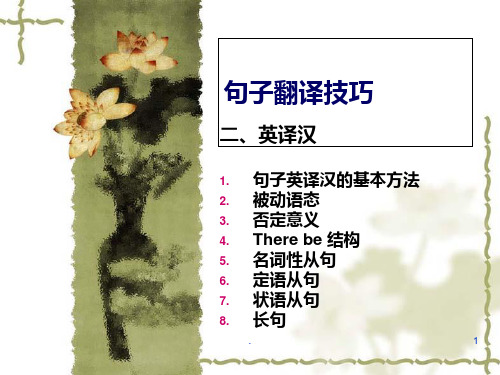
3. There are not many classmates who agree with me. 同意我意见的同学不多。
4. One could not be too careful when driving a car. 驾车时越小心越好。
❖ It is a truth universally acknowledged that a single man in possession of a good fortune must be in want a wife.
❖ 凡有产业的单身汉,总要娶位太太,这已经是一 条举世公认的真理。
❖ The idea that the life cut short is unfulfilled is illogical.
(或:驾车时再小心也不为过。)
5. Not until the invention of the high altitude rocket did the direct study of the upper atmosphere become possible. 直到发明高空火箭之后,直. 接研究上层大气才成为可能。11
.
9
否定含义
英语的否定大致有以下几种:
1. 完全否定 2. 部分否定 3. 双重否定 4. 否定的转移
.
10
练习四
1. He would do anything he was asked to do but return to his old life.
2. 叫他干什么他都愿意,只要不再过以往那种日子就行。
英译汉的翻译方法和技巧
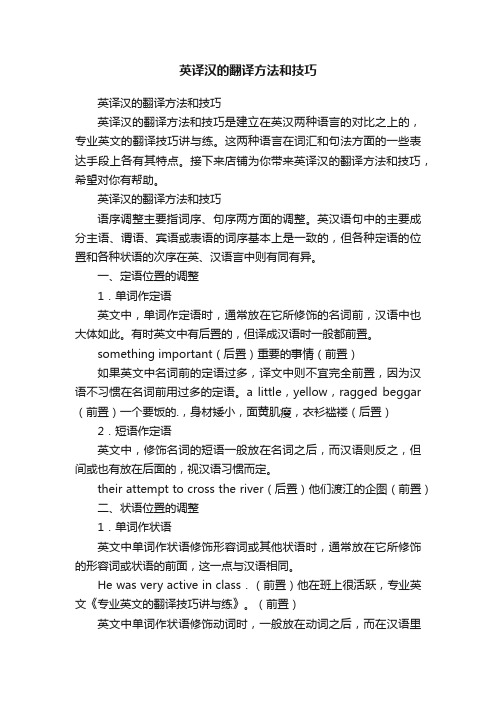
英译汉的翻译方法和技巧英译汉的翻译方法和技巧英译汉的翻译方法和技巧是建立在英汉两种语言的对比之上的,专业英文的翻译技巧讲与练。
这两种语言在词汇和句法方面的一些表达手段上各有其特点。
接下来店铺为你带来英译汉的翻译方法和技巧,希望对你有帮助。
英译汉的翻译方法和技巧语序调整主要指词序、句序两方面的调整。
英汉语句中的主要成分主语、谓语、宾语或表语的词序基本上是一致的,但各种定语的位置和各种状语的次序在英、汉语言中则有同有异。
一、定语位置的调整1.单词作定语英文中,单词作定语时,通常放在它所修饰的名词前,汉语中也大体如此。
有时英文中有后置的,但译成汉语时一般都前置。
something important(后置)重要的事情(前置)如果英文中名词前的定语过多,译文中则不宜完全前置,因为汉语不习惯在名词前用过多的定语。
a little,yellow,ragged beggar (前置)一个要饭的.,身材矮小,面黄肌瘦,衣衫褴褛(后置)2.短语作定语英文中,修饰名词的短语一般放在名词之后,而汉语则反之,但间或也有放在后面的,视汉语习惯而定。
their attempt to cross the river(后置)他们渡江的企图(前置)二、状语位置的调整1.单词作状语英文中单词作状语修饰形容词或其他状语时,通常放在它所修饰的形容词或状语的前面,这一点与汉语相同。
He was very active in class.(前置)他在班上很活跃,专业英文《专业英文的翻译技巧讲与练》。
(前置)英文中单词作状语修饰动词时,一般放在动词之后,而在汉语里则放在动词之前。
Modern science and technology are developing rapidly.(后置)现代科学技术正在迅速发展。
(前置)2.短语作状语英文中短语状语可放在被修饰的动词之前或之后,译成汉语时则大多数放在被修饰的动词之前,但也有放在后面的。
Seeing this,some of us became very worried.(前置)看到这种情况,我们有些人心里很着急。
- 1、下载文档前请自行甄别文档内容的完整性,平台不提供额外的编辑、内容补充、找答案等附加服务。
- 2、"仅部分预览"的文档,不可在线预览部分如存在完整性等问题,可反馈申请退款(可完整预览的文档不适用该条件!)。
- 3、如文档侵犯您的权益,请联系客服反馈,我们会尽快为您处理(人工客服工作时间:9:00-18:30)。
英汉翻译实用技巧(2)
读者常犯的另外一个错误是译文洋腔洋调,生硬拗口,不忍卒读。
这种毛病称为“翻译腔”。
请看下面的例子:
•Last two decades witnessed a fairly rapid development of China’s economy.
过去二十年目睹了中国经济相当迅速的发展。
译文完全照搬了原文的语序,读来非常生硬。
可改为“过去二十年中,中国经济的发展相当迅速。
”又如:
•Yes to life, no to drugs.
这句话是“世界禁毒日”的宣传语,与其对应的汉语宣传语是“热爱生命,远离毒品”。
而初学者可能会情不自禁地译成“对生命说是,对毒品说不”,这样的译文脱离不了原文的桎梏,不能称为佳译。
总之,表达阶段就是译者把自己从原文所理解内容用本族语言重新表达出来,表达的好坏主要决定于对原文理解的深度以及对译文语言的修养程度。
表达是理解的结果,但理解正确不意味着必然能表达得正确,需要涉及许许多多具体方法和技巧的问题,其中最基本的两种方法是直译和意译。
(一) 直译
按照《现代汉语》的定义,所谓直译就是在译文语言条件许可时,在译文中既保持原文的内容,又保持原文的形式,特别指保持原文的比喻、形象和民族、地方色彩等。
这并不是说对原文逐字对译的“死”译,而是指在忠实于原文思想内容的同时,保持原文的语言特色:即忠实地传达深层结构的同时,又能再现表层结构的风格。
例如:•Hitler was armed to the teeth when he launched the Second World War, but in a few years, he was completely defeated.
希特勒在发动第二次世界大战时是武装到牙齿的,可是不过几年,就被彻底击败了。
这里习语armed to the teeth,形象生动,自解放初期就直译为“武装到牙齿”,已习惯成自然了。
如译为“全副武装”,语气反而较弱。
(二)意译
意译(liberal translation)指翻译时只将原文信息传达出来,而不必拘泥于原文的形式,包括句子结构,用词,比喻等修辞手段。
直译和意译属于两种不同的表达方式,在翻译过程中,哪种方式能较好地体现“忠实,通顺”的翻译标准,就采取哪种方式。
但是,作为初学者,一定要明白,直译绝不是死译或字字对译,而意译也绝不是胡译或乱译。
这里就有一条非常重要的原则,希望大家谨记:能直译时尽量直译。
不能直译时就意译(Translate literally, if possible; or, appeal to liberal translation).
直译和意译都只能是在一定条件下所能运用的,两种方法都有其限度,超出限度,直译就会变成令人不可解读的死译、硬译,意译就会变成随意发挥的胡译、乱译。
一部好的译作总是既有直译又有意译,所以我们翻译时必须做到“用两条腿走路”,“量体裁衣”,即使是针对同一个句子也是如此,例如:
•Don’t cross the bridge till you get to it.
走一步看一步,没到桥边别想过桥的事儿。
直译和意译之争由来已久,而且至今依然未分出高下。
当然,这是一个理论问题,还是留给理论家们去争论。
作为初学者,对于一个句子的翻译,究竟用哪种方法比较好,主要的判断依据是:译文是否正确传达出了原文的意义,译文是否流畅和地道。
以下我们将通过一些译例来加以分析和判断。
•Do you see any green in my eye?
你以为我是好欺骗的吗?
如按原文逐词直译为“你从我的眼睛里看到绿色了吗?”就叫人不知所云了。
所以只能意译。
•But the long and exhausting trip proved too much for him.
译文:但是这次疲惫不堪的长途旅行证明了许多东西。
上文的译文貌似忠实,实则与原文的意义相去甚远。
主要原因是译者没有弄清楚原句的结构,原文的粗体部分并非动词宾语,而是主语补语。
正确的译文应该是“但是这次旷日持久的长途跋涉把他的身体累垮了。
”
•They parted enemies.
译文:他们与敌人分道扬镳。
由于同样的原因,译者错误地理解了句子成份之间的关系,从而造成了误译。
应改为“他们不欢而散,成了冤家。
”
•Example is not the major thing in influencing others. It’s the only thing.
上句的关键是要理解并译好example一词,可依据上下文的提示得出正确结论。
切勿简单地译成“例子,榜样”等,可做一点变通,译为“以身作则,身体力行”等词。
全句译文为“以身作则并不是影响他人的主要途径,而是唯一途径。
”
•The bilateral treaty will be good for 50 years.
上句的good是一个异常简单的字,没有人会承认自己不会译。
但是,切记,一个词的译法大多数情况下要取决于上下文,决不能简单地用已知的意义去套。
如上句译为“这个双边条约的有效期为50年”。
如果有人译成了“这个双边条约将在50 年内是好的”,则既不“信”也不“顺”,是所谓的“瘪三译文”。
初学者要引以为戒,从不放过哪怕是极简单的,极常见的词的翻译。
唯此,才能有所收获,有所进步。
三、校核阶段
尽管我们在翻译时十分细心,但译文难免有错或字句欠妥的地方。
因此校核是使译文符合忠实、通顺的翻译标准所必不可少的一个阶段,在校核阶段一般应特别注意以下各类:
1) 校核译文在人名、地名、日期、方位、数字等方面有无错漏;
2) 校核译文的段、句或重要的词有无错漏;
3) 修改译文中译错的和不妥的句子、词组和词;
4) 力求译文没有冷僻罕见的词汇或陈腔滥调,力求译文段落、标
点正确无误;
5) 通常必须校核两遍。
第一遍着重校核内容,第二遍着重润饰文字,如时间允许,再把已校核两遍的译文对照原文通读一遍,作最后一次的检查、修改,务使所有问题都得到解决,译文才算是定稿。
练习
一、试译下列句子
1. She is too young to look after herself.
2. A man who doesn’t try to learn from others can’t achieve much.
3. He talks as if he knew everything.
4. It is funny that a beautiful girl like her should fail in love with such an ugly man.
5. Do you see any green in my eye?
6. The old man’s heart missed a beat when he saw the pearl.
7. A good dancer never missed a beat.
8. If we don’t hang together, they shall hang us separately.
9. It is a truth universally acknowledged, that a single man in possession of a good fortune must be in want of a wife.
10. Tom left the shop without a word.
11. Gonna fight with me? Tell’em I am read for it. I am always ready for it.
12. Even the pine logs which bur。
